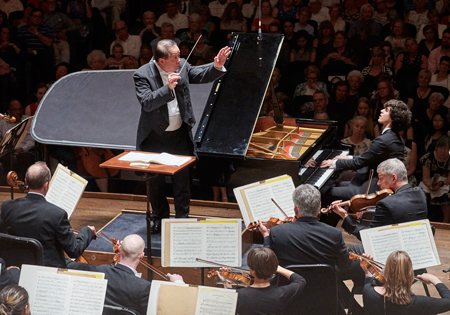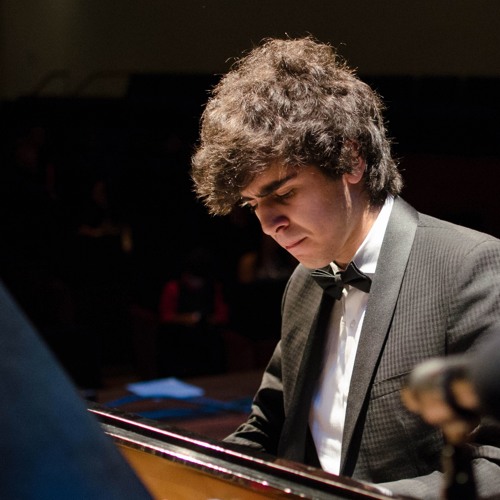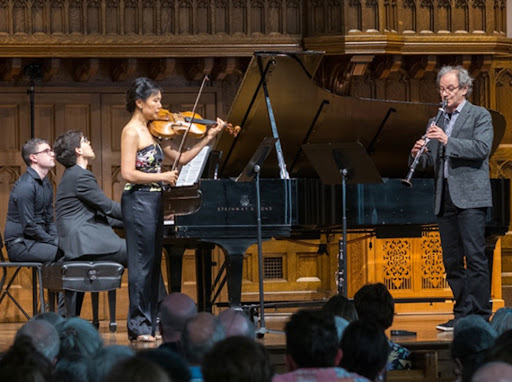by Daniel Hathaway

He has competed twice in the Thomas and Evon Cooper International Competition at Oberlin, making it into the finals in 2013, when he also won the Audience Prize. He finished second in 2016, when photographer Roger Mastroianni captured him here in the heat of collaboration with Jahja Ling and The Cleveland Orchestra. We were impressed:
17-year-old Evren Ozel, from Minneapolis, learned Beethoven’s fourth concerto expressly for this competition, and the results of his preparation were impressive. His interpretation shone both with technical poise and poetry — basking in the moment of performing on the Severance Hall stage with his excellent colleagues.
Ozel’s conversations with the orchestra in the second movement recitative were tersely philosophical, and he played the final movement rondo with lilting charm. His concerto choice was risky but admirable. This is not one of those fast-and-loud-wins-the-prize works, but one that holds a mirror up to the innate musicality of the person at the keyboard. On Friday, Ozel’s reflection positively glowed. —ClevelandClassical.com, July 24, 2016.
So, obviously, were Franklin and Diana Cohen, who invited Ozel to join ChamberFest Cleveland three seasons ago as a “rising star.” He returns this summer for three days of concerts from June 16-18. I reached him by phone to talk about what he’ll be up to.
Daniel Hathaway: You’ve got a very busy three days at ChamberFest, I see.
Evren Ozel: Yes, and I’m very much looking forward to it. I remember it being pretty busy the last time I went, which was in 2019, but it’s such a wonderful experience, and they’re all very exciting pieces that I’m really looking forward to playing.
DH: Did you have any say in choosing the repertoire?
EO: I didn’t — I was given the assignments in late January, early February in an email, and that was that!
DH: Let’s talk through the pieces. You’re starting with Grieg’s duo piano arrangement of Mozart’s 16th Sonata. What is that like?
EO: For me, the Primo part is just the Mozart Sonata. The Secondo part is like an obbligato that Grieg wrote on top of it — that’s what Roman Rabinovich will be playing. It’ll be interesting. I haven’t played that sonata in years, and in a way it’s one of the pieces I feel the most insecure about, because everyone plays it when they’re a very young kid. I’d be worried if it didn’t sound absolutely impeccable. I’m looking forward to preparing it as a chamber work rather than as a solo piece.
DH: George Walker has certainly risen above the horizon as a composer recently.
EO: He’s a wonderful composer. I played his Fifth Sonata on The Gilmore Rising Star series in March 2021, and to me, his music communicates this sense of strength. His piano writing feels like it’s so grounded — its power and emotional impact really come from that. The Cello Sonata is a very fun piece. The last movement in particular has this dance-like quality — very rhythmic and very, very fun.
DH: Have you played with Sterling Elliot?
EO: I’ve never even met him before, but I’m looking forward to it. I’ve heard performances on YouTube and such, and he’s obviously a wonderful cellist.
DH: Now on Friday, you’re doing the Porgy and Bess Heifetz arrangement with violinist Sarah Kapustin.
EO: I’ve also never met Sarah before, though we’ve messaged a bit on social media. But the Heifetz pieces are wonderful arrangements of great music, pure enjoyment — like serotonin for me.
DH: And I’d be willing to bet that Galina Ustvolskaya is a new name for you.
EO: Correct. I understand that she was a student of Shostakovich. Her piece [the Clarinet Trio] has a lot of dark moments, and there’s something almost cold about it. The last movement has this unflinching motion of quarter notes in the piano that just goes and goes and goes.
DH: Then I don’t know if this is saving the best — or the longest — for last, but your third concert features the Schubert B-flat Piano Trio.
EO: My absolute favorite trio, and the first piece of chamber music I played after the pandemic hit. That was at the Gardner Museum, and because of COVID regulations, there were exactly nineteen people in the audience.
DH: You weathered the pandemic okay, then?
EO: We’re all totally fine. That was my last year at the New England Conservatory, and there was an option to do half the year remotely, and half in person. There were many people who went fully remote, but I came back to Boston and had lessons and did chamber music in person. The rest of my classes were all held over Zoom.
It was a bit lonely at school, but there were some plusses. It’s always tough to find a practice room at NEC, but during the pandemic, that wasn’t an issue at all. This year we were back in person, and it was very nice to have the halls filled with music again — even if rooms are hard to come by.
DH: What are your plans for the rest of the summer?
EO: After ChamberFest, I’ll go back to Boston for a week, and then I’ll spend my third summer at Marlboro. It’s kind of like a musical retreat. Obviously there’s a lot of intense rehearsing and practicing and music-making, but without really worrying about all the other things in life, it feels somewhat like a vacation. So it’s very nice.
Published on ClevelandClassical.com June 8, 2022.
Click here for a printable copy of this article





